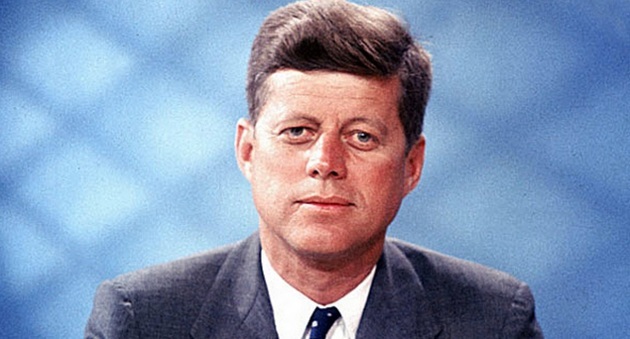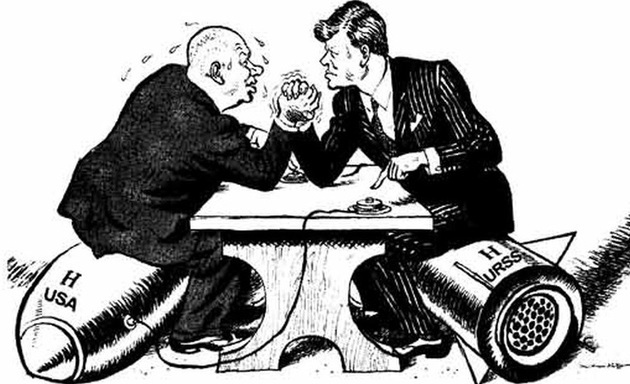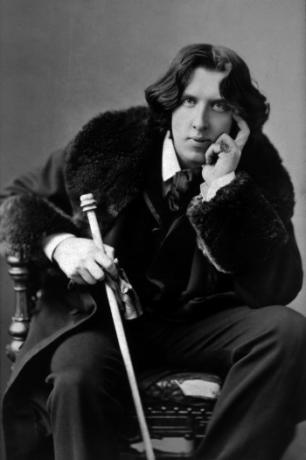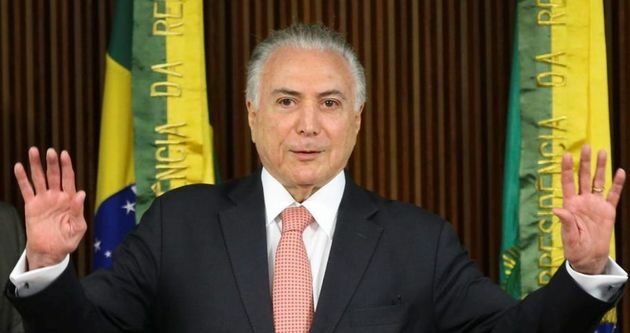John Fitzgerald Kennedy (1917-1963) was a military man, politician, and president of the United States from 1961 to 1963.
His government took place in the middle of the Cold War and was marked by the construction of the Berlin Wall, the Missile Crisis, the Space Race, the Vietnam War and the American Civil Rights Movement.
President Kennedy was assassinated on November 22, 1963 while visiting with his wife, Jacqueline Kennedy, the city of Dallas, Texas.

Death
John F. Kennedy was assassinated by Lee Harvey Oswald (1939-1963), a former US Marine. Oswald, in turn, was killed by Jack Ruby (1911-1967), two days after the crime, when he was being taken from the police station to the state prison.
Thus, Kennedy's death was never fully explained, which fueled several conspiracy theories.
After ten months of investigations conducted by “Committee of Investigation into the Assassination of President Kennedy”, it was concluded that Oswald and Ruby acted alone. Lee Oswald probably assassinated President Kennedy for personal reasons.
Anyway, in 1976, the "American House of Representatives Commission to Investigate the Killings of Kennedy and Martin Luther King Jr".
Again, it was concluded that Lee Oswald's action was a solitary one and that the term “conspiracy” was inadequate to classify the murderer's attitude. Likewise, no foreign government or US intelligence agency would be involved in the crime.
However, this Commission criticized the FBI and the CIA, claiming that the American agent was not sufficiently protected that day.
JFK History
John Fitzgerald Kennedy, known as JFK, was born on May 29, 1917, into a wealthy American Catholic family. His father was a diplomat, owned rural properties and provided his children with a good education.
Kennedy studied at private colleges and attended Harvard University, traveled through Europe and spent two months in South America.
When World War II broke out, he enlisted in the Navy, first reporting to his superiors and later, promoted to lieutenant, commanded patrol and reconnaissance boats in the Pacific.
On one of these missions, his boat was hit by a Japanese destroyer and broke in two. The crew managed to survive by swimming to the nearest island, and Kennedy was awarded for helping his men.
political career
John F. Kennedy chooses to pursue a political career driven by his father. After his older brother's death, he takes on the challenge of occupying a seat as a federal deputy, for the state of Massachusetts, in 1946. He is re-elected and in 1950 runs for senator and emerges victorious.
The next step is to be able to project your image nationally and overcome the American electorate's fear of a Catholic candidate.
After an intense campaign and three television debates that were crucial in this election, Kennedy defeats the Republican candidate Richard Nixon and is elected president in 1960.
Marriage to Jacqueline Kennedy

John Kennedy and journalist Jacqueline Bouvier become engaged in 1953 and marry in the same year. They are two rich young people from traditional American families.
"Jackie," as she will be known, will bring her refinement to the White House and be the perfect mother's counterweight to womanizer John F. Kennedy.
The couple would have four children, but only two reached adulthood: Caroline (1957) and John Kennedy Jr. (1960-1999).
Government John F. Kennedy
Kennedy's government came into full swing. Cold War. The construction of the Berlin Wall, the fact that Cuba passed to the Soviet sphere and the Space Race are some facts that reverberated around the world.
Let's look at some of them:
Berlin Wall
The Berlin Wall was erected in the socialist part of the German city which was located in the middle of the territory of the German Democratic Republic (East Germany).
The wall was erected to contain the continual flight of East German citizens to the capitalist side. Thus, it became the most visible symbol of the ideological war waged between the US and the USSR.
The height of tension between the United States and the USSR took place on October 27, 1961. On that day, an American diplomat was detained by the authorities in the Oriental Germany.

The Americans sent their tanks to the "Check Point Charlie", one of the posts where it was possible to cross the border, and they threatened to bomb it if the citizen of the United States did not return home.
In turn, the Soviets did the same, and both armies stood by, waiting for the problem to be resolved. Fortunately, the American diplomat was released and no one fired a shot.
On June 26, 1963, Kennedy visited West Germany and delivered a speech against communism to a crowd of Berliners.
Space race
The Space Race was a dispute between the Soviet Union and the United States for dominance of the Earth's orbit and for which country would be capable of taking the first human being into space.
The Soviet Union took the lead in taking the first living being, the dog Laika, on November 3, 1957. Then, the Soviet Yuri Gagarin, would be the first man to go around the Earth orbit, on April 12, 1961.
This caused President John Kennedy to declare in May 1961 at NASA that the United States should get the first men to walk on the moon before the end of the 1960s.
In fact, the United States could do it with the Apollo 11, on July 20, 1969.
Missile Crisis
The Missile Crisis was one of the moments of great tension during the Cold War involving the United States, the Soviet Union and Cuba. At this point, there were real chances that a third world war would happen.
In 1961, the Cuban leader Fidel Castro, announces that the Cuban Revolution would implant a socialist regime in the country. This meant having an ally of the Soviet Union a few miles off the American coast.
So the Americans planned an invasion of the country through the Bay of Pigs, but they were repulsed. This was a hard defeat for the United States.

The following year, the US espionage service detects that the Soviet Union was installing a missile launch base capable of reaching American territory.
Thirteen days of tension follow, between October 16 and 23, 1962, when photographs of the island of Cuba are analyzed by the presidential crisis commission.
In the end, President Kennedy decides to "quarantine" any boat approaching the Caribbean island with a suspicious cargo. The measure gets support from the UN and the OAS (Organization of American States).
The most tense moment was when eighteen Soviet ships headed for Cuba. Everything was prepared for the Americans to approach him, but sixteen of them give up and back down. The remaining two are boarded by the Americans and released to reach their destination.
Curiosities
- Kennedy was the first Catholic American president and the second youngest to govern the United States.
- President Kennedy's name is the name of several places in Brazil, such as Vila Kennedy (RJ), born in the government of Carlos Lacerda or Avenida Kennedy, in São Bernardo do Campo (SP).
Sentences
- Don't ask what your country can do for you. Ask what you can do for your country.
- Change is the law of life. And those who only look to the past or the present are sure to miss the future.
- Courage is keeping the class under pressure.
- The essential bond that unites us is that we all inhabit this little planet. We all breathe the same air. We all care about our children's future. And we are all mortal.
- Sometimes it is necessary to stop and look away, so that we can see what is in front of us.
read more:
- U.S
- The Watergate Case
- Soviet Union
- Cuba
- Vietnam War
- Communism
- OAS - Organization of American States
- Sputnik Satellites
- man's journey to the moon



